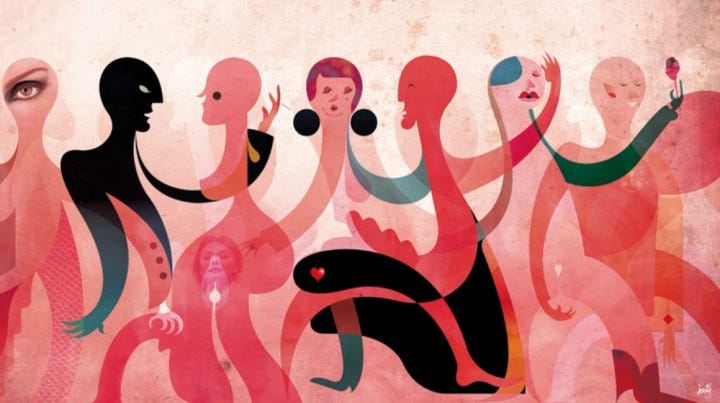
On Labor Day, I call loudly for sex work to be decriminalized worldwide.
They teach Labor Day to American children ahistorically, calling it a great festival to honor the working people of the United States. But it was actually founded in 1894 as a conciliatory gesture by President Grover Cleveland, six days after he deployed 12,000 troops to break up a wage strike by unskilled railroad ground crews, sparking violence and the killing of two protestors. To take Labor Day back, we must learn from history, and make our understanding manifest with action.
As I grew up and learned the history of working class struggles, Labor Day changed for me, from barbecues and anxiety about the first day of school to a time to remember that history, and to reflect on its implications for the future. Today, as I finish tidying up from my work as a professional dominatrix, I know that Labor Day is a time to honor all workers — those working legally and illegally, in trade unions and unorganized, in factories and homes, in fields and offices.
And, even though our work is criminalized and stigmatized by society, it is a time to honor sex workers.
Sex work is famously called the oldest profession, but it gets little respect. All of us, wherever and however we work — in bedrooms and dungeons and parlours, on the streets, on camera, or dancing on stage — bring skill, ingenuity, creativity, and experience to our work, but media portrayals objectify us, calling us broken or evil, and traitors to the feminist cause. What these portrayals, and the policymakers who use them, almost never do is see us as workers.
But workers we are, and our work isn’t that different from many other forms of labor — especially labor traditionally reserved for women — that society devalues. We use our bodies and our sex appeal at work, but that isn’t unique to sex work. The caretaker who strains her back cleaning the bottoms of bedridden patients, turning them to prevent pressure sores, certainly uses her body; the waitress or secretary knows that femininity, attractiveness, and emotional labor are often unpaid, unacknowledged parts of the job description.
Sex work is famously called the oldest profession, but it gets little respect. Click To TweetSex work is a dangerous job, but so is fishing, or working on an oil rig, or working day after day without enough sleep; while society calls for better conditions for workers, in orchards and unlicensed cabs and Amazon warehouses, it doesn’t stop to consider that that’s what sex workers want, too. Instead, the United States criminalizes sex work, and calls it progressive to do so — even when that criminalization prevents us from organizing and fighting for our rights as workers, and is the root cause of what makes our work dangerous.
On Labor Day, I call loudly for sex work to be decriminalized worldwide, because I know that workers ourselves know best how to stamp out coercion and exploitation in our industry. Society would draw lines between us, dividing those of us who love our work from those of us who hate it, distinguishing those of us with managers from those of us who work independently, splitting us by race or gender or nationality or type of work. But sex workers reject all of those divisions, and stand united across our differences in our call for decriminalization.
If you honor the workers today, honor us. Stand with us.
![]()
In honor of Labor Day, The Establishment has curated the following 11 stories about the sex work industry, in America and abroad.
Lessons From America’s First Female-Run Sex Club
July Westhale

Unsurprisingly, almost every early industry boom with a primarily male workforce in America had a sordid entanglement with sex work of some sort, dating back to the early gold rushes — the California Rush in 1848 and the Yukon Gold Rush in 1896. In fact, back then, there weren’t many primarily female work forces with the exception of sex work.
Your Mother Is A Whore: On Sex Work And Motherhood
Jessie Sage

Why It’s Okay To Pay For Sex
Margaret Corvid

In the wake of Amnesty International’s adoption of a policy supporting the full decriminalization of sex work, sex worker rights are under intense debate and scrutiny. But falling to the wayside of this discourse is the fact that arresting clients isn’t the answer to any question that either side of that debate might usefully ask. It doesn’t decrease the risk of violence, rape, and arrest for sex workers. It doesn’t eliminate sex work, and it does nothing to end patriarchy, male entitlement, or rape culture.
I Ain’t Saying She’s A Gold Digger: Sex Work, Money, And Upward Mobility
Margot St. Vincent

I like being a call girl. It is the best paying job I’ve ever had. My strong abilities to be empathetic and kind to a spectrum of people, my tendency to be a barometer for emotional temperatures in the room, and to locate and diffuse situations with aplomb and grace, make me very good at my job.
The Tweets Of A Whore: Persona And Privacy In The Age Of Social Media
Tina Horn

On one hand, I’ll admit that it’s incredible for people who enjoy my sex performance to see what I have to say — about sex, or coffee, or music, or an article. But on the other, sometimes I get the impression that people feel entitled to it because of what I am — which is a whore — and what I do‚ which is making money by working hard at the words and sex I love. I feel as if the world expects me to outsource my imagination, and every ounce of my gut screams at me to stop. After all, my imagination is my livelihood.
I’m A Sex Worker Who Was Raped, Here’s Why I Didn’t Fight Back
Holiday Black

Serial rapists and murderers often target sex workers, with full knowledge that those workers are the most vulnerable due to their lack of protection under the law, before moving on to target other women. It’s almost impossible to get real statistics on the subject of sexual violence against workers due to the criminal nature of our work, but estimates say that those in the sex trade have a 45% to 75% chance of experiencing sexual violence on the job. There are numerous examples of murderers and rapists who target sex workers — but what’s troubling is that, more often than not, we don’t take this violence seriously when it is recounted by those who experience it first hand.
Margaret Cho On Sex Worker Rights
Margaret Corvid

Sex work exists whether or not it is legal, and the fact that we are outside of the “bounds of legality” means we are dying. It’s not right. It’s dehumanizing and sex work needs to be recognized as work.
The Exhausting And Unpaid Emotional Labor Of Sex Work
Margot St. Vincent

Because arrangements are based on the pretense of the “girlfriend/mistress” experience and are often ongoing, the emotional labor required to tend to men and their struggles has me working more hours than I’m actually getting paid for — getting texts that interrupt my private life, dealing with their personal crises that arise at times that are actually quite inconvenient for me (and, frankly, above my pay scale), catering to their changing schedules, and balancing the delicate act of receiving money for services, yet not actually talking directly about receiving money for said services.
Sex Workers And Other Women In The Arts
Violet McLean

As sex workers, we stand at the edges of what culture deems acceptable, and are often subject to violence as a result. This vulnerability to violence is more acute depending on where a sex worker works; if they are transgender, gender non-conforming, or a person of color; and whether or not they hold citizenship in the country in which they work.
Diaries Of A High Femme Whore
Margot St. Vincent

I am an ambassador of reality and fantasy. I sit in on meetings and report back from two worlds. I contain multitudes. So much of my prowess with this comes from surviving domestic violence, from being able to recognize emotional temperatures and diffuse or infuse. To be able to read desires. To be able to self-protect. So I can truly make my subs believe I own them, and I can truly care for them instinctively, unconsciously. It’s a skill I am grateful for, though it comes from darkness.
What A Sex Worker Can Teach You About Working For Yourself
Margaret Corvid

Capitalism loves to tell us that the customer is always right, and that if they pay you, then you, the business owner, must bow to their every whim. I’m here to tell you that’s bullshit. If you have a boss, in sex work or any other business, dealing with horrible customers can be part of the price of employment — but one of the advantages of working for yourself is that you can give a lousy customer the boot.

